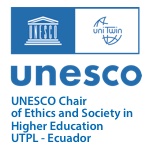SAFA: The Knowledge And The Reality Of Farmers In The Classroom
Abstract
In the teaching / learning process in the search for digital literacy within human development, it is essential to generate a space for interaction with new technologies. SAFA Small farmers assess sustainability under four dimensions: 1) Good Governance, 2) Environmental Integrity, 3) Resilience Economy and 4) Social Welfare; this innovation generates a change in the paradigm of education and involves the commitment of teaching and the potential of their computational skills to promote critical thinking and computational foundations in students, with the purpose of interaction between the field and the classroom, the results of research and the satisfaction of the peasants, students and professors are reflected.
Downloads
References
Kalúz, Martin, Javier Garcia–Zubia, Miroslav Fikar, and Lubos Cirka (2015). «A Flexible and Configurable Architecture for Automatic Control Remote Laboratories». IEEE Transactions on Learning Technologies 8, no. 3: pp. 299–310. https://doi.org/10.1109/TLT.2015.2389251
Fundación Telefónica (2017). «La educación STEM, la educación del siglo XXI». http://fundaciontelefonica.com.ec/2017/04/18/la-educacion-stem-la-educacion-del-siglo-xxi/.
MIT iCampus (2017). «iLabs». http://icampus.mit.edu/projects/ilabs/.
Uzcanga, Izaskun, Margarita Gómez, and Mauricio Duque. 2015. «Llevando las Ciencias, la Ingeniería, la Tecnología y la Matemática a la Escuela: Pequeños Científicos». 13th LACCEI Annual International Conference: «Engineering Education Facing the Grand Challenges, What Are We Doing?». https://doi.org/10.18687/LACCEI2015.1.1.084
Copyright (c) 2019 © Analysis

This work is licensed under a Creative Commons Attribution-NonCommercial-NoDerivatives 4.0 International License.








